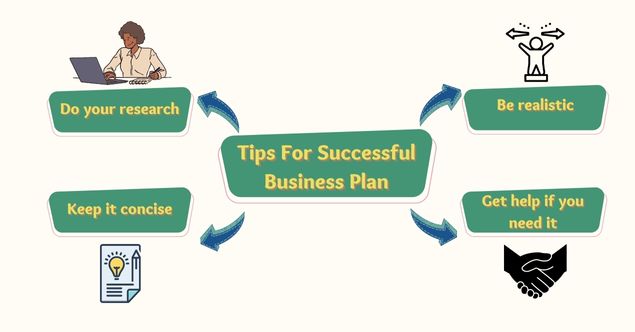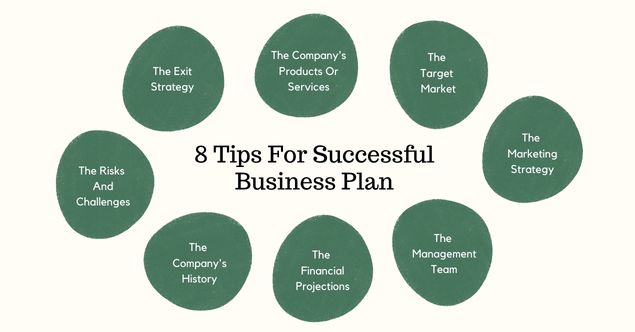What Is a Business Plan?
A business plan is a written document that outlines your business. It covers everything from your business history and current status to your sales and marketing strategy and how you plan on turning a profit. A business plan is critical for all businesses, no matter how small or large. Without one, it's difficult to track your progress and make adjustments as needed. Plus, if you're ever looking for investors or loans, a strong business plan will give them the confidence they need to support your venture.
Why do I need a business plan?
A business plan is important because it gives you a road map to follow as you start and grow your business. It can help you attract new investors and customers, and keep everyone on track as you move forward.
How often should I update my business plan?
You should update your business plan as your business grows and changes. At a minimum, you should review and revise it annually. However, you may need to make more frequent updates if you're experiencing rapid growth or making major changes to your business.
What are the three main purposes of a business plan?
The three main purposes of a business plan are to:
- Help you get a clear picture of your business and what you want it to achieve
- Convince investors or lenders to support your venture
- Keep you on track as you grow your business
If you're just starting out, a business plan can also help you get a better understanding of your industry and how to position your company in the market.
What are the key components of a business plan?
There is no one-size-fits-all answer to this question, as the key components of a business plan vary depending on the type and size of the business. However, all plans should include an executive summary, an overview of the company's history, a description of products or services, the target market, the sales and marketing strategy, and financial projections.
What are some tips for writing a successful business plan?

Here are a few tips to help you write a successful business plan:
- Do your research. Before you start writing, find out as much as you can about your industry and what it takes to start and grow a successful business in that field.
- Be realistic. Don't try to inflate your numbers or make unrealistic predictions in an effort to make your business look more successful than it is. Investors will see through this and it will damage your credibility.
- Keep it concise. No one wants to read a 100-page business plan. Try to keep your plan to 10 pages or less, with clear and concise language.
- Get help if you need it. If you're not sure where to start, there are plenty of business plan templates and examples available online. You can also hire a professional business plan writer to get the job done for you.
What are some common mistakes to avoid when writing a business plan?
Here are a few common mistakes to avoid when writing a business plan:
- Not doing your research. Before you start writing, find out as much as you can about your industry and what it takes to start and grow a successful business in that field.
- Making unrealistic predictions. Don't try to inflate your numbers or make unrealistic predictions in an effort to make your business look more successful than it is. Investors will see through this and it will damage your credibility.
- Overcomplicating things. No one wants to read a 100-page business plan. Try to keep your plan to 10 pages or less, with clear and concise language.
- Not getting help when you need it. If you're not sure where to start, there are plenty of business plan templates and examples available online.
Types of business plans:
There are two types of business plans: traditional and lean startup.
Traditional business plans
A traditional business plan is a document that typically includes detailed information about the company's products or services, marketing strategy, management team, financial projections, and more. This type of business plan is often used by banks and other investors to get a better understanding of the company before they provide funding.
Writing a traditional business plan can be a daunting task, but it doesn't have to be. By understanding the structures of traditional business plan s and what should be included in each section, you can make the process much simpler.
A traditional business plan typically includes the following sections:
-The executive summary is the first section of the business plan and it should provide an overview of the main points of the plan.
-The company description is the second section and it should provide more detail about the company, its history, its products or services, and its mission.
-The market analysis is the third section and it should provide information about the target market, the competition, and the market trends.
-The fourth section, sales and marketing strategy, should describe how the company plans to generate sales and grow the business.
-The fifth section, management team, should provide information about the company's management team and its experience.
-The sixth section, financial projections, should provide financial information about the company, such as its revenue, expenses, and profitability.
-The appendix is the last section of the plan and it should include any additional information that would be helpful for understanding the company.
Lean business plans
A Lean business plan or Lean startup business plan is a shorter and simpler version of a traditional business plan. It focuses on the key elements of the company, such as the problem that it solves, the target market, the solution, the business model, and key metrics. This type of business plan is often used by startup companies that want to get a better understanding of their business before they start raising money.
Simple business planning makes writing a plan faster and easier, and helps you get your thoughts down on paper so that you can better understand your business.
To write a lean startup business plan, you'll need to:
-Identify your target market
-Describe your solution
-Explain your business model
-Define your key metrics
-Set your milestones
How should a business plan look?
A good business plan should be:
- Concise: The best business plans are clear, concise, and to the point. They are not overly long or filled with unnecessary fluff.
- Realistic: A good business plan is realistic and achievable. It sets realistic goals and milestones, and it doesn't make promises that can't be kept.
- Flexible: A good business plan is flexible and can be adjusted as the company grows and changes.
- Focused: A good business plan is focused on a specific market or opportunity. It doesn't try to do too much or be all things to all people.
When you're writing a business plan, it's important to keep in mind that the goal is to create a document that will be used to help you run and grow your business. This means that the plan should be clear, concise, and achievable. It should also be flexible so that it can be adjusted as the company grows and changes.
Finally, it should be focused on a specific market or opportunity. By remembering these key points, you can make sure that your business plan is as effective as possible.
How to Write a Solid Business Plan, Step by Step Guide
There are some key steps that all businesses should take when writing a business plan.
1. Define the purpose of the business plan.
2. Research the market and competition.
3. Describe the company and its products or services.
4. Develop a marketing and sales strategy.
5. Create financial projections.
6. Write the executive summary.
7. assemble and organize the plan.
8 Review and revise the plan as needed.
By following these steps, you can be sure that your business plan is comprehensive and well-organized, and that it will effectively communicate your business's goals and objectives.
Challenges you face while writing a detailed business plan
Writing a business plan is not a cup of tea. It includes many tasks like establishing the business’ focus, obtaining funding, and getting new investors. Your business plan is essentially your road map to success.
It is critical to have a business plan if you are obtaining funds and the difficulty you face depends upon the type of business you have, the size of your business, and the intricacy of your desired result.
It is unique to every business as it tells about:-
- The current position of your organisation,
- Overall prospects of your industry(e.g., developing, stagnant or decreasing),
- How you stand unique among the competitors,
- What are your predictions for your sales and revenue for the next year, next five years, etc.,
- How will you make your estimation realistic?
For industries like finance, there are additional regulations that have to be included.
The challenges you face while writing a business plan depend upon the type of business you have, the size of your business, and the intricacy of your desired result. However, some key challenges include:
- Getting Started: The most important and difficult part about writing a business plan is getting it started. Until and unless you make a blueprint of how you should strategize it, you will continue messing it up. When you start making a business plan, lock yourself in a room, switch off your phones, and focus.
- Defining the purpose of the plan: What is the goal of the business plan? What are you hoping to achieve with it?
- Researching the market and competition: What is the current market landscape? Who are your major competitors?
- Describing the company and its products or services: What does your company do? What are its unique selling points?
- Developing a marketing and sales strategy: How will you generate leads and convert them into customers?
- Writing the executive summary: How do you concisely and effectively communicate the key points of the plan?
- Assembling and organizing the plan: How do you structure the plan so that it is easy to read and understand?
- Reviewing and revising the plan: Is the plan realistic and achievable? Does it need to be updated as the company grows and changes?
- Financial Estimation: It is difficult to estimate the figures on a brand-new concept. There is no roadmap, nobody whom you can follow. Find a similar company and try to measure how they identify their cash flows and make the plan.
- Prove that your business idea is best: One of the challenging problems in writing a business plan is to prove the investors and lenders that your idea is worth their investments otherwise they won’t take interest in your idea.
- Realistic Business Plans: You need to be honest about the plans, generally, entrepreneurs’ dream about their business, and when they make a business plan, it challenges their assumptions about the opportunities in their market, its competition, products and growth estimations. That is where they get caught up in defining an executable business plan. Create a strategy that you will actually be working upon not just making castles in the air.
By keeping these challenges in mind, you can ensure that your business plan is as strong as possible.
Is it hard to write a business plan?
The difficulty you face depends upon the type of business you have, the size of your business, and the intricacy of your desired result.
Do I Need a Simple or Detailed Plan?
The type of business plan you need depends on your goals and objectives. If you are seeking funding, you will need a more comprehensive and detailed plan. If you are not seeking funding, a simpler and shorter plan may suffice.
How long does it take to write a business plan?
Again, the answer to this question depends on the type of business you have, the size of your business, and the intricacy of your desired result. A simple plan can be completed in a matter of hours, while a more detailed plan can take days or even weeks to complete. No matter what type of business you have, it is important to take the time to carefully craft a well-thought-out business plan.
Who can make me a business plan?
There are a number of resources available to help you write a business plan. You can hire a professional business plan writer, use a business plan template or software, or even do it yourself.
The 5 toughest things entrepreneurs face when starting a business

1. Coming up with a business idea
2. Researching the market and competition
3. Describing the company and its products or services
4. Developing a marketing and sales strategy
5. Creating financial projections
Are business plans useful?
Business plans can be an invaluable tool for any business, small or large. By taking the time to write a comprehensive and well-organized plan, you can effectively communicate your company's goals and objectives, and make sure that everyone on your team is on the same page.
A business plan can also help you raise money from investors, and keep track of your company's progress over time. Whether you are starting a new business or growing an existing one, a business plan is an essential tool.
By taking the time to research and write a well-thought-out plan, you can increase your chances of success and ensure that your business is on the right track.
8 Tips for Successful Business plan

There are a 8 key pieces that should be included in every successful business plan.
-The company's products or services: Describe the problem that your product or service solves and how it is different from other products or services on the market. Be sure to include information about the features and benefits of your product or service.
-The target market: Describe the people or businesses that you plan to sell your product or service to. Be sure to include information about their needs and how your product or service meets those needs.
-The marketing strategy: Describe how you plan to market your product or service to your target market. Be sure to include information about your sales process, pricing strategy, and promotional activities.
-The management team: Introduce the people who will be responsible for running the day-to-day operations of the business. Be sure to include information about their experience, skills, and education.
-The financial projections: Include detailed financial statements that show how much money you expect to make and spend over the next three years. Be sure to include information about your revenue, expenses, and profits.
-The company's history: Describe the history of the company, including any milestones or accomplishments.
-The risks and challenges: Discuss the risks and challenges that your business faces and how you plan to overcome them.
-The exit strategy: Describe how you plan to exit the business, such as selling it to another company or taking it public.
FAQs on Writing a Business plan
The biggest mistake is not doing your homework. Make sure you understand your industry, your market, your competition, and your customers before you start writing your business plan.
While a business plan is not required if you are not seeking funding, it can still be a valuable tool for any business. A business plan can help you to clarify your goals and objectives, and keep track of your company's progress over time.
Yes, there are many business plan templates available online. However, it is important to make sure that the template you choose is appropriate for your industry and business model.
There is no hard and fast rule for the length of a business plan. However, a good rule of thumb is to keep it as concise as possible. Your goal should be to communicate your company's key points in a clear and concise manner.
A bad business plan is one that is either too long or too short, and does not effectively communicate your company's key points. It should also be free of grammar and spelling errors, and should be clear and easy to read.
One way to make your business plan stand out is to include a cover letter that briefly introduces your company and its products or services. You should also make sure to proofread your business plan carefully, and have someone else read it as well before you submit it.
There are many reasons why business plans fail. Sometimes, the company does not do enough research on the market or the competition. Other times, the plan is not well-written or organized. And sometimes, the company simply does not have a viable business model.
You should update your business plan as your company grows and changes. As your business evolves, so too should your business plan. Review and update your plan at least once a year, or more often if needed.
The biggest challenges in scaling a business include finding new customers, expanding into new markets, and hiring new employees. As your company grows, you will need to find ways to reach new customers and continue to provide excellent customer service. Additionally, you will need to expand your operations to meet the demands of your growing business. Finally, you will need to hire new employees to support your company's growth.
Summary
A business plan is a road map to success and is critical for obtaining funding. A well-written, proofread business plan will make your company more likely to succeed. The biggest challenges in scaling a business include finding new customers, expanding into new markets, and hiring new employees.
With careful planning and execution, you can overcome these challenges and successfully scale your business. By following these tips, you can ensure that your company is well-positioned for growth.
By following these tips, you can write a comprehensive and well-organized business plan that will help you achieve your desired results. With a little time and effort, you can put your company on the path to success.




